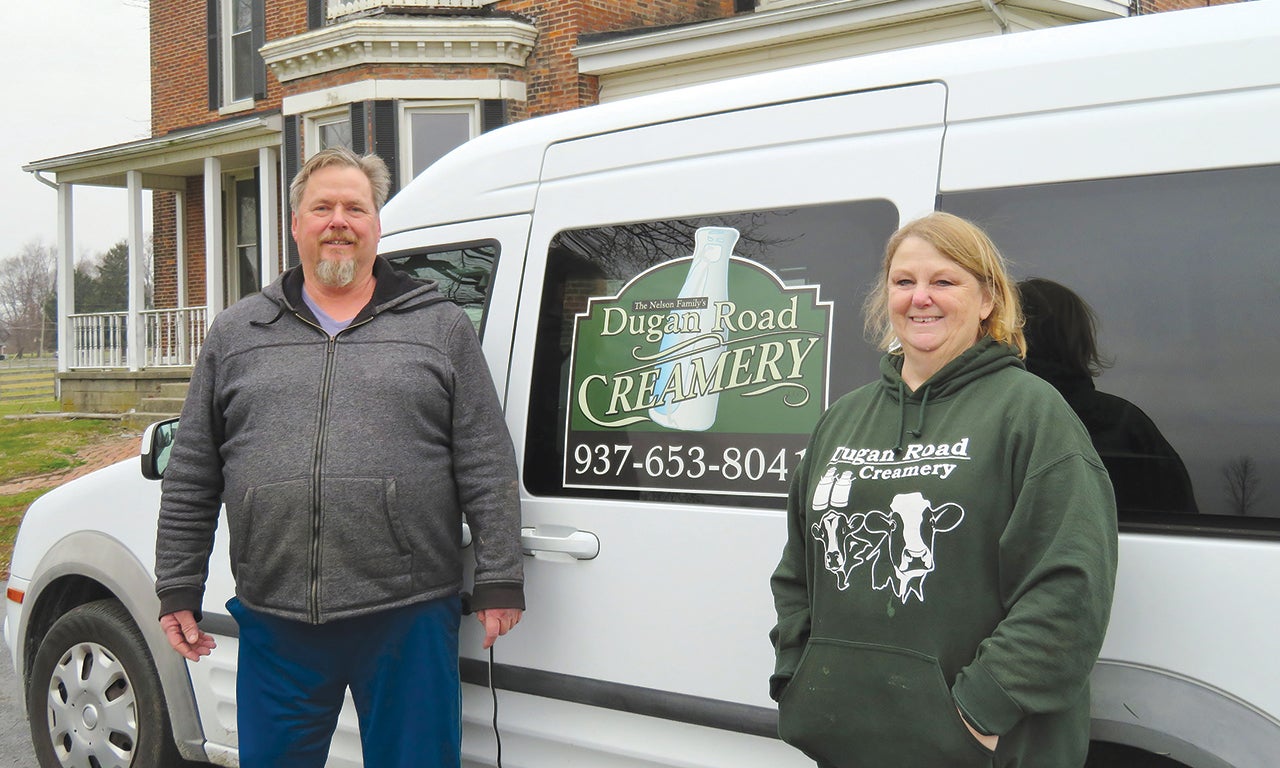In the pale light of a wintry afternoon, Joyce Nelson leads the way past the milking parlor and into the barn at Dugan Road Creamery. The contented sound of lowing mingles with the faint aroma of hay as two Holstein calves step out of their stalls to greet Joyce and eagerly press their soft, pink muzzles into her outstretched hands.
“This is Wilma, and this is Penny,” she says proudly. “Wilma is two weeks old, but Penny was born last week.”
Joyce and her husband, Chris, are Pioneer Electric Cooperative members who live on a 22-acre farm near Urbana. They’ve raised Holsteins for decades. Chris grew up on an Arizona dairy farm that boasted one of the largest herds in the nation in the 1950s. “I’ve been milking cows since I was 8 years old,” he says. “I hardly know anything else and always do it the best I can.” Joyce, who is from Ontario, met Chris when he was working on a farm his father had in Canada. The self-described “city girl” fell for Chris — and for dairy farming. “I started out feeding one calf, and before I knew it, I was milking cows every day,” says Joyce. “When our second child was just 6 hours old, she was out in the barn with me while I milked.”
After moving to Champaign County in 1988, the Nelsons worked their family dairy farm with the help of their four children and sold their milk to a national milk-marketing cooperative. In recent years, however, plummeting milk prices soured their profits. The couple made the difficult decision to sell most of their 45 cows and take advantage of the “locavore” trend by changing their business model from a conventional dairy farm to a microdairy processor and retailer.
“Microdairies are already big on the East Coast, especially in places like New Hampshire and Vermont,” Chris says. “The appeal is that people want to buy milk directly from a farmer and see for themselves how the animals are treated. Microdairies are much more artisanal than the big commercial operations.”
After purchasing a vat pasteurizer and bottler, the Nelsons converted part of their farm’s milk house into a processing plant and opened Dugan Road Creamery in 2017. They now produce fresh whole milk; soft cheeses, such as mozzarella and halloumi; cream cheese in several flavors; Greek-style yogurt; and kefir, a fermented beverage with a tart taste. “Kefir is a probiotic drink,” Joyce says. “It’s like Activia times a thousand.”
Dugan Road Creamery specializes in creamline milk, which is pasteurized but not homogenized. “With our milk, the cream rises to the top, so you have to give the bottle a good shake before pouring it,” Joyce says. There are people who believe that homogenization compromises milk’s health benefits by using high pressure to break up its fat molecules. “The fat in milk is what helps your stomach digest it,” Joyce says. “People come here because they can’t drink store-bought milk. One guy who was told he was lactose intolerant is so excited because he can drink our creamline milk.”
The Nelsons currently have five cows that each produce 70 pounds (about 8 gallons) of milk per day. They’ve expanded their product line to include chocolate, strawberry, orange creamsicle, and cookies-and-cream flavored milk, and in addition to their farm store, which is open most evenings and by appointment, several independent grocers and specialty shops now carry Dugan Road Creamery’s milk and cheese. Like the milkmen of bygone days, Chris even delivers to dozens of businesses and homes. His route extends from Sidney to Lebanon, and individual customers simply put their money in an insulated cooler by their front door.
“Operating a microdairy is almost more work than when we were milking 45 cows because we’re processing milk and cheese daily,”” Chris says. “That daily processing is what allows us to sell a very fresh product to our customers.”










